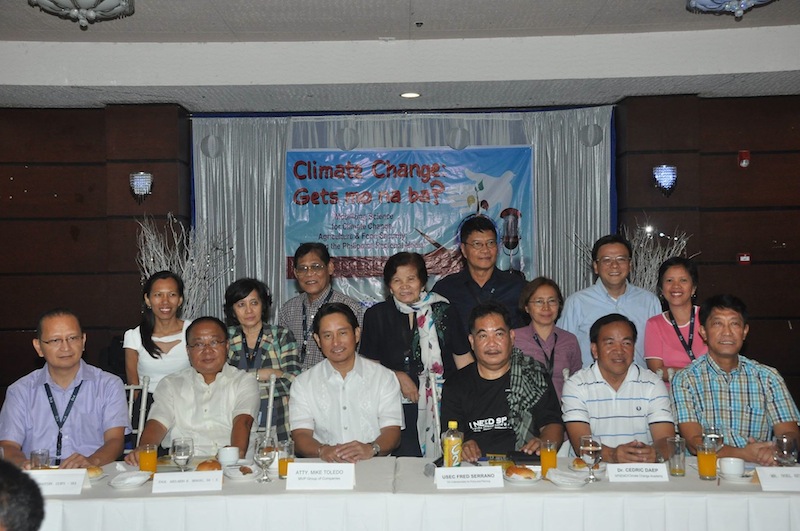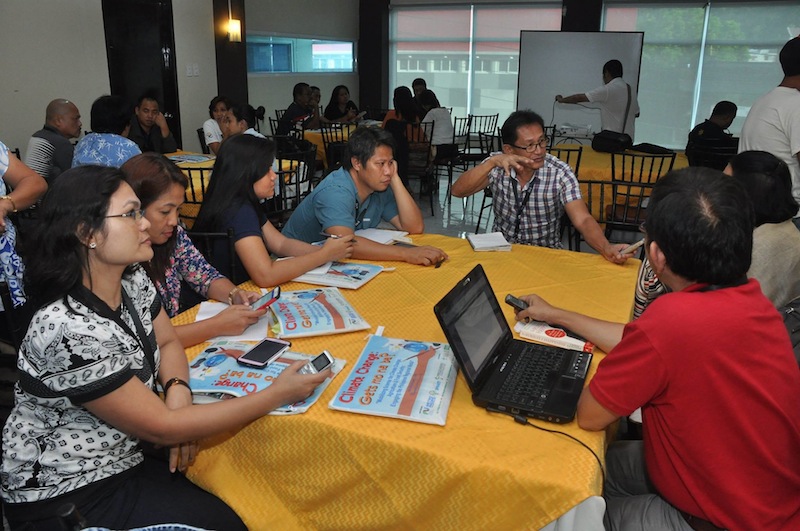The media plays a critical role in public understanding of climate change as well as influencing policymakers to make potential, urgent climate actions. Yet, many journalists in the Philippines desire an improved understanding of the science of it, its causes and consequences, vulnerable communities, impacts to food security, health, livelihood, environment and especially on how to improve climate change reporting.
From prolonged droughts to heavy flooding, rising seas and erratic, fiercer typhoons, scientists have said in many scientific studies that climate change effects are already hitting the poor and vulnerable the hardest, including millions of people in the Philippines. While it is an overwhelming issue, climate change could well be the story of the century and it is important to bring it to the center of media coverage.
According to Rex Navarro, Director of the Philippine Agricultural Journalists (PAJ), climate change “can no longer be ignored.” Political action, increasing public awareness and policy change are what we need to address, he said.
“ The media can play a crucial role in disseminating useful climate information to effectively guide public discourse and understanding about the weather and climate change, and how to urgently act on climate change. It is just fitting that we assist our colleagues in understanding the issue better,” said Navarro, who is also a consultant of the Climate Change, Agriculture and Food Security (CCAFS).
Noel Reyes, Vice-President of the PAJ, said reporting on climate change poses particular challenges to provincial journalists the reason for involving other media organizations to lead the series of workshop like the Philippine Network of Environmental Journalists (PNEJ), the Philippine Federation of Rural Broadcasters and the Philippine Science Journalists.
“ We aim to empower local journalists to effectively report on climate-related issues, and how can we strengthen their professional capacity to produce greater quality and volume of reporting,” Reyes said, adding that various sectors supported the conduct of the workshops such as the CGIAR Research Program on Climate Change, CCAFS Southeast Asia, International Rice Research Institute (IRRI), World Agro-Forestry Center (ICRAF), the Department of Agriculture, MVP Group of Companies and the Metro Pacific Investments Corp.
Dr Rosa Perez, climate expert and consultant at the Asian Development Bank, said journalists need to understand at least the basic of climate change and the science behind it, adding that scientific facts are also crucial in conveying climate messaging to the public.
The series of workshops focus on food security, agriculture and the human dimension of climate change starting from the disaster-prone Legazpi City held July 30-August 1, to typhoon-hit Tacloban City in August to the threatened coastal island of Siargao in September and to the hottest place in the country, Tuguegarao City in October.
In Legazpi City last week, more than 50 local journalists participated in the workshop hoping to enhance their capacities in reporting climate change and to raise the level of public awareness and discourse, said Imelda Abano, President of the PNEJ.
At the workshop, participants had the opportunity to learn and share good practices on climate-related issues as well as the roles of media in climate communication and public access to information.
“ It is important for journalists to be equipped with some basic knowledge and tools as well as motivation to tackle climate change by providing an overview of issues from science, to policymaking to communicating it effectively,” Abano stressed. ” Another important aspect is the collaboration between and among journalists, climate scientists, researchers and institutions to articulate issues and concerns on climate change mitigation, adaptation and its relation to food security and agriculture.”
Abano suggested the publication of a climate change guidebook for Philippine journalists to enable journalists to understand key concepts, effectively report on climate-related issues and to make climate change reporting appealing to the public.
Former Representative Angelo Palmones of the Philippine Science Journalists, on the other hand, suggested the development of a modular workshop sessions in understanding climate change and communicating it to the public and policymakers.
During the recently conducted first leg of the workshop in Legazpi City in Albay, local journalists learned the basics of climate science from climate scientist Dra. Rosa Perez; the climate change mitigation and adaptation program of the government through Department of Agriculture Secretary Sigfredo Serrano; corporate social responsibility on addressing climate change with Metro Pacific Investments Corp Atty Mike Toledo; zero-casualty program of Albay through Cedric Daep of the Albay Public Safety and Emergency Management Office; introducing smart-agriculture and farming techniques from Dr Leo Sebastian, the Porgram Leader of Climate Change, Agriculture and Food Security (for Southeast Asia); government policy update from Rep. Rodel Batocabe of AKO Bicol Party; forestry concerns from Amy Cruz of the World Agro-Forestry Center; agriculture policies from Eliseo Ponce, DA consultant on climate change; DA Bicol regional executive director Abelardo Bragas on local agriculture situation.
In communicating climate change, resource speakers were: Tony Lambino, head of communication of the International Rice Research Institute; Senior journalists Louie Tabing of the Federation of Rural Broadcasters, former Rep Angelo Palmones of Philippine Science Journalists and Imelda Abano of the Philippine Network of Environmental Journalists (PNEJ). Present at the workshop are the officers and board of directors of the Philippine Agricultural Journalists.
photo credit: Dept of Agriculture Bicol
Latest posts by EnviroNewsph (see all)
- Global fund aimed at protecting nature and accelerate investment in conservation, launched in Canada - August 25, 2023
- Why ‘loss and damage’ is the most bitterly fought-over issue at COP27 climate talks? - November 18, 2022
- U.S. hands over P2.3M in equipment and wildALERT system to PH to protect wildlife - December 16, 2020




